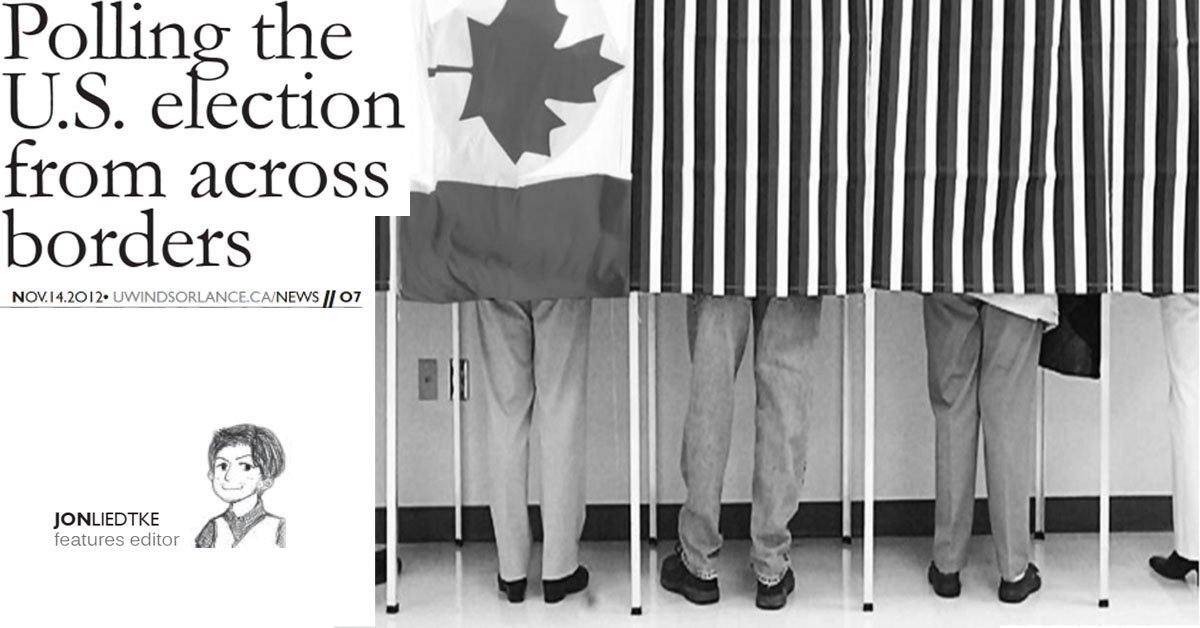UWindsor Lance
Issue , Volume 85
Nov. 14, 2012
Jon Liedtke
Last week, 123 million people voted in the 2012 U.S. presidential election. President Barack Obama was reelected for a second term, winning 332 electoral seats to Governor Mitt Romney’s 206.
Helping push the ballot in Obama’s favour were American ex-pats who chose to engage in the electoral process. There are around 300,000 eligible U.S. voters living in Canada, according to the 2006 Canadian Census. In a 2010 survey by the U.S. Federal Voting Assistance Program, 70.5 per cent of the nearly 48,000 overseas Americans polled said they usually voted in elections over the past six years.
Ex-pats can cast a ballot online, by mail or at a U.S. embassy or consulate. But U.S. states are no longer required to send out ballots to voters, including absentee ballots, so the task falls on Americans abroad to make sure their voice is heard. The
Lance reached out to Canadians who were eligible to vote in the election to see how they voted and why continuing to vote in U.S. elections are important.
“l voted for Barack Obama for the second time,” explained Marie Jeannette, a University of Windsor graduate and producer for Mimetic Entertainment. Jeanette holds dual citizenship with the United States. “I was impressed with the things he
had done in this term and wanted to give him an additional term so that he could continue the work he was doing.”
Jeannette voted for Obama this year because she believes that the equality of each citizen is important to him and that he “aims to reflect this in programs, services and legislation.”
“l think it’s important that every citizen, no matter their race, gender, socioeconomic status or sexuality, ought to be considered equal in the eyes of the government and treated as such, and Barack Obama is a president who not only believes that, but his record shows that he continually supports and works to achieve this equality, “Jeanette continued, “I feel that Mitt Romney would
not be a president for 100 per cent of American citizens as he is unsupportive of or completely opposed to marriage equality, universal healthcare, LGBT rights and equal work for equal pay. And he didn’t have many answers as to what to do with
immigration issues facing the United States.”
While Jeannette is not opposed to voting for a Republican candidate in the future, she believes that the party needs to assess the state of modern conservatism and decide where they stand as “the Republican party seems, at this time, a very exclusive party.”
Christopher Scott-Reese, who attended high school in Windsor and later enrolled in the United States Marine Core, voted for Obama. “I agree with his policies more than I agree with Mitt Romney’s,” said Scott-Reese, who believes that Romney’s
stance on foreign policy platform and tax reform were vague. “And his stance on abortion— which was all over the place— killed his campaign. The lack of female votes Romney received is a direct reflection of this.”
This election marked the first one that Scott-Reese voted for, as he cites his military service made it difficult to do so in 2008. “I believe that everyone who is of age, especially young people, should educate themselves in politics and vote because
ultimately it is us who are the future leaders of our respective countries.”
Voting is also of the utmost importance to Claire Doey, a psychology student at the University of Victoria. “There’s a certain rush to it, knowing I’m able to participate when not too long ago I wouldn’t have been able to. This sounds kind of cheesy but I really do get amped up about voting.”
Doey and Scott-Reese are not alone in their patriotism. U.S. citizens abroad remain engaged in the electoral process. A 2005 study by the Federal Voting Assistance Program reveals that in the year prior, the amount of overseas Americans voting
was 79 per cent among uniformed people, 80 per cent among and federal civilian employees and 58 per cent for other U.S. citizens. These groups all saw increased voting rates over the previous four years, while just 64 per cent of Americans at home voted.
“There are so many people in this world that will likely never have a chance to defend their rights and to decide how their country should be governed,” remarked Doey, who gave her vote last week to Obama.
“He shares the same values I do regarding women’s health and gay rights. As someone who has dozens of queer friends in both Canada and the United States, and as a human being with a uterus and the desire to maintain control over that, I had to back the guy who is backing me.”
Polling the U.S. election from across borders
Issue Volume 85
Nov. 14, 2012
Jon Liedtke
Page 7
Jon Liedtke was the Features and Opinions Editor, Advertising Manager and Deficit Consultant at the UWindsor Lance.




Leave a Reply